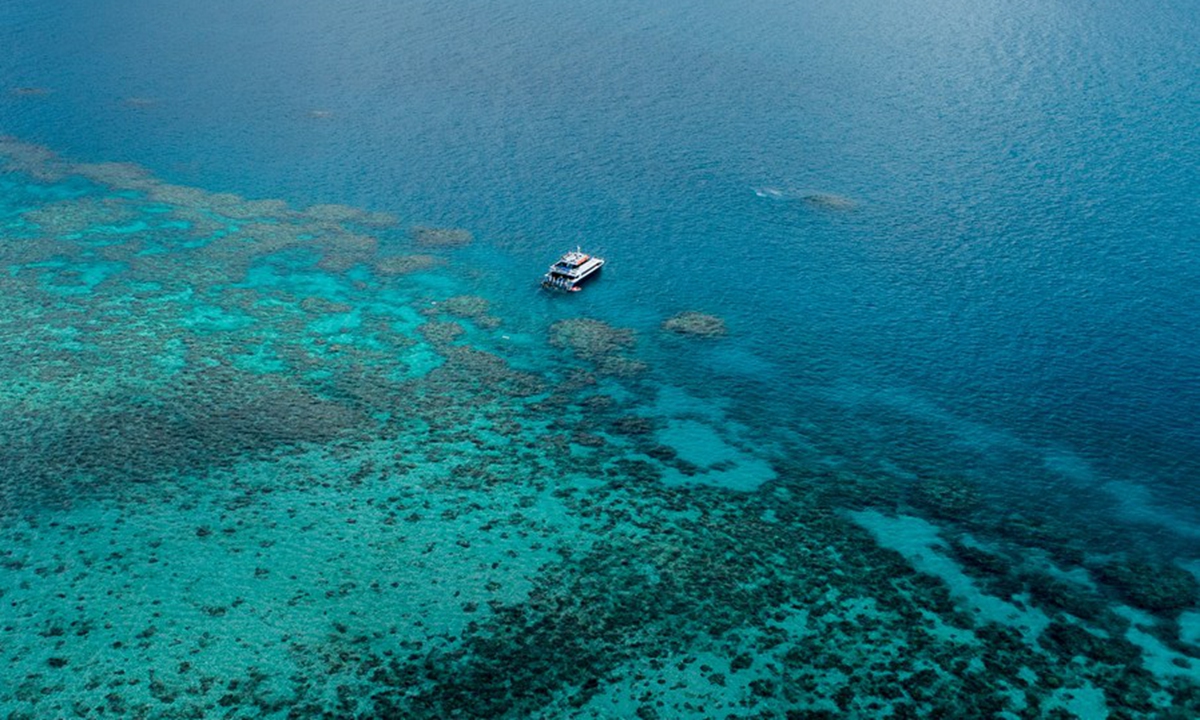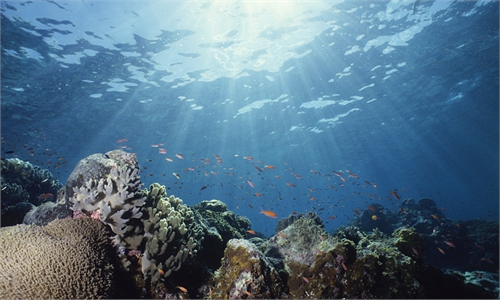
Aerial photo taken on June 2, 2021 shows the Great Barrier Reef in Queensland, Australia. The Great Barrier Reef, the world's largest coral reef in Australia's state of Queensland, is described as the "planet's most beautiful marine environment" and is the main conservation target of the Citizens of the Great Barrier Reef, a charity cooperative organization that runs a series of preserving programs. (Photo by Hu Jingchen/Xinhua)
Claiming the Great Barrier Reef is "the best managed reef" despite its deteriorating conditions, Australia's opposition to UNESCO's proposal to label its national treasure as "in danger" reflects its short-sightedness in only seeing the economic value in the reefs, Chinese experts said on Tuesday.
They called on Canberra to stop unreasonably targeting China and politicizing the matter, but to fulfill its duty to protect the world heritage.
Ahead of the 44th session of the World Heritage Committee (WHC) in Fuzhou, East China's Fujian Province, the Australian government reacted angrily to the UNESCO's announcement made last month, accusing China, which is chairing the meeting this year, of "steering directions as a political maneuver."
Australia's Environment Minister Sussan Ley called the decision "flawed," saying that "clearly there were politics behind it," AFP reported.
Responding to the allegations, Tian Xuejun, vice minister of education and director of the Chinese National Commission for UNESCO, said on July 5 that the proposal was based on data from Australia and recommendations from an advisory body, the International Union for Conservation of Nature and Natural Resources (IUCN).
Tian urged Australia to attach importance to the opinions of the advisory bodies and fulfill its duty as a member state of the WHC and protect the environment surrounding the reefs.
Observers said that the "negative attitude" from the Morrison government is due to the huge tourism value and high employment opportunities of the Great Barrier Reef.
"The reef can bring approximately $3.66 billion in revenue every year, and can create about 64,000 jobs annually. If the UNESCO recommendation passes, the country will have to partially shut down tourism in the area, which could lead to an annual loss of as high as $732 million to $1.46 billion," Yu Lei, chief research fellow at the research center for Pacific island countries of Liaocheng University, told the Global Times on Tuesday.
In a letter sent to UNESCO in July and signed by 10 leading NGOs in Australia, environment groups and renowned scientists recommended to inscribe the Great Barrier Reef on its "in danger" list, given the poor water quality that has been degrading inshore coral reefs.
As many as 71 percent of Australians think the reef is in danger, while 77 percent support the WHC to put it on the "in danger" list, showed a polling conducted by Australian Marine Conservation Society in July.
"It is absurd that the Australian government imputes the recommendation to the Chinese government and tries to politicize the issue of the heritage," Chen Hong, a professor and director of the Australian Studies Centre under East China Normal University, told the Global Times on Tuesday.
Chen pointed that Canberra's allegations were an "overreaction" and full of "hostility" as they did not behave so strongly when former US president Barack Obama warned about protecting the Great Barrier Reef in 2014.
"It is a shame that the Australian government can't face its own mistakes and throws dirt at China," Chen said, warning that if the Morrison government still refuses to take any action to the threatened reef, larger areas of corals might die due to rising sea temperatures caused by global warming.
He said the recommendation is likely to be passed.
In 2019, Australia's reef authority downgraded the reef's condition from poor to very poor in its five-year update.
Around half of Australia's Great Barrier Reef has died since the 1990s, according to a study published in the Proceedings of the Royal Society Journal.



